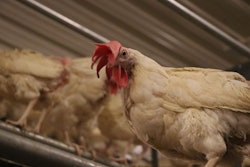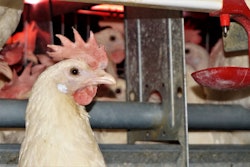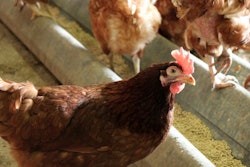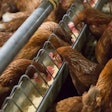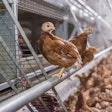
The top 20 U.S. egg producers – according to data from Egg Industry’s Top Egg Company Survey, which is part of WATT Global Media’s database on the world’s leading broiler, turkey and egg producers – are ranked according to the size of their layer flocks at the end of 2020.
Collectively, the top 20 U.S. egg companies for 2021 account for 245.36 million birds, which is a decrease of 9.19 million birds from 2020.
1. Cal-Maine Foods, 44.26 million hens
The largest producer and marketer of shell eggs in the United States, Cal-Maine Foods had 44.26 million laying hens as of December 31, 2020.
Fred R. Adams Jr., 88, founder and chairman emeritus of Cal-Maine Foods Inc., died on Sunday, March 29. Adams founded Adams Egg Co. in 1957, which was the predecessor to Cal-Maine Foods Inc., in 1969. He served as chairman and CEO of the company until 2012, at which time he was named chairman emeritus.
Max Bowman, chief financial officer of Cal-Maine Foods, addressed the egg market due to the COVID-19 pandemic, what implications it might have on the industry and how Cal-Maine is handling the virus-related situation during an April 2 conference call.
"We believe we are taking all the needed precautions in the management of our operations in the response of the outbreak of COVID-19. To date, Cal-Maine Foods facilities are operating relatively normally, and we have not experienced any supply chain or delivery disruptions," Bowman said during the call.
He emphasized that the company's top priority is the health and safety of its employees.
"As part of the nation's food supply, we work in a critical infrastructure industry and we have a special responsibility to maintain a normal work schedule," he said.
In April, Texas Attorney General Ken Paxton filed a lawsuit against Cal-Maine Foods, alleging the egg producer was taking unfair advantage of the COVID-19 disaster declaration in the state by gouging prices by as much as 300%. Cal-Maine Foods, however, said prices are higher as the COVID-19 pandemic caused a massive disruption in the egg industry, pushing retail demand for eggs to historically high levels, causing a temporary increase in egg prices. Cal-Maine said it strongly denied Paxton’s allegations and was prepared to vigorously defend itself. The lawsuit was dismissed without prejudice. The company’s motion to dismiss the suit was granted on August 13 in the District Court of Harris County, Texas.
Cal-Maine Foods reported a significant increase in sales for the fourth quarter of 2020 compared to the same time period the year before. The results for the quarter, which ended May 30, and the fiscal year 2020, were released on July 20. For the fiscal year 2020, net sales were $1,351.6 million compared to $1,361.2 million for the prior year. The company reported net income of $18.4 million, or $0.38 per basic and diluted share, for fiscal 2020, compared with net income of $54.2 million, or $1.12 per basic and diluted share, for the prior year.
“Fiscal 2020 demonstrated Cal-Maine Foods’ resiliency in the face of challenging business conditions and volatile egg prices. After three fiscal quarters characterized by an oversupply of eggs and depressed market prices, demand for eggs increased and market prices rose 62.4% during our fourth fiscal quarter over the average price for the first three quarters, as consumers purchased more eggs for preparing meals at home in response to the COVID-19 pandemic,” Dolph Baker, chairman and CEO of Cal-Maine Foods Inc., said in a press release.
Texas Agriculture Commissioner Sid Miller joined Cal-Maine Foods for an egg donation event that provided 140,000 meals to local Texans amid the pandemic in July. More than 280,000 eggs were donated to the Central Food Bank and offered local communities’ essential protein in trying times. Cal-Maine Foods donated close to a quarter-million dozen eggs to organizations within the state and even more nationwide, a July press release said.
Cal-Maine Foods announced in August an underwritten public offering of 6 million shares of its common stock by Jean Reed Adams, the wife of the company’s late founder, Fred R. Adams, Jr., and a trust of which their four daughters, Luanne Adams, Nancy Adams Briggs, Laurel Adams Krodel, and Dinnette Adams Baker, are beneficiaries. According to Cal-Maine Foods, the selling stockholders were also expected to grant the underwriters of the offering an option to purchase within 30 days up to an additional 900,000 shares or common stock, if any. The selling stockholders informed the company that they were selling to pay estate taxes resulting from Adams’ death, and to generate liquidity. In August, Jean Reed Adams offered an additional 600 shares of common stock for a public offering price of $39 per share. In addition, the Selling Stockholders have granted the underwriters a 30-day option to purchase up to an additional 900,000 shares of the common stock, at the public offering price, less the underwriting discount.
James Hull retired from Cal-Maine Foods, effective October 30. Hull had been with the company since 1991, and most recently served as vice president, egg products, with responsibility for managing the company’s wholly owned subsidiaries, American Egg Products LLC, located in Blackshear, Georgia, and Texas Egg Products, located in Waelder, Texas. Timothy Thompson will assume the management of the egg products division in addition to his current responsibilities for all the company’s Arkansas and Kansas operations. He will continue to report directly to Sherman Miller, president and chief operating officer of Cal-Maine.
On December 15, the company announced that its board of directors approved a $40.1 million capital project to expand the company’s cage-free egg production at its Guthrie, Kentucky, facility. The project will include related site work and the additional infrastructure to convert existing conventional capacity to house approximately 1.5 million cage-free hens and 300,000 pullets. Construction will commence immediately with initial conversions expected in early 2021, first pullet placements by summer 2021 and the first layer house finished by fall 2021. Project completion is expected by late 2022. The company plans to fund the project through a combination of available cash on hand, investments and operating cash flow.
An early morning fire was reported on December 17 at a Cal-Maine Foods operation in Dade City, Florida. According to a report from ABC Action News, the fire was reported around 11 a.m. by a person who lived on the property. Three barns were destroyed, each of which had chickens inside. It was estimated that at least 250,000 birds were killed.
2. Rose Acre Farms, 27.60 million hens
Rose Acre Farms is the second largest egg company in the U.S., ranked by number of layers. In addition to table eggs, Rose Acre Farms produces a variety of egg products ranging from liquid eggs and dried eggs to egg protein powder.
During the end of January, Greg Hinton, vice president of sales, Rose Acre Farms, Seymour, Indiana, was elected chairman of the board of directors of U.S. Poultry & Egg Association.
In April, WATTPoultry reported that the egg producer was joining forces with North Carolina’s Electric Cooperatives and Tideland EMC to develop an agricultural microgrid that brings enhanced environmental sustainability and power grid resiliency to the farm and surrounding community.
“Rose Acre Farms was looking for innovative ways to increase the sustainability of its egg production,” said Lisa Crawley, the senior public relations specialist at North Carolina’s Electric Cooperatives. “This new project at Rose Acre Farms will incorporate solar panels, energy storage and a microgrid controller owned by North Carolina’s Electric Cooperatives. This project is an excellent example of how electric cooperatives can partner with their consumer-members to achieve win-win scenarios.”
Rose Acre Farms said on its website in May that during the pandemic it would prioritize donating eggs.
In June, an appeal of a case in which Rose Acre Farms was accused of conspiring with other egg producers to raise the price of eggs was denied by a federal court. The United States Court of Appeals for the Third Circuit denied an attempt by a group of direct egg purchasers to revive the case against the egg producers. In the suit, the plaintiffs claimed the egg companies conspired to reduce the egg supply in the United States and increase prices through adherence to a program that would give caged laying hens more space, according to a press release from Porter Wright, a law firm that represented Rose Acre Farms in the case. Rose Acre prevailed in the case, in which the jury found that while the company participated in an agreement, its conduct was reasonable and was not in violation of antitrust laws.
Seymour, Indiana, newspaper The Tribune reported on July 30 that “Rose Acre Farms recently made the decision to suspend crushing of genetically modified soybeans at its oil extraction plant at Acme for the immediate future. Chief Operating Officer Tony Wesner said Wednesday the decision was made as a result of changes in the market for soybean oil.”
Wesner told the local newspaper that “the economics of the business have gotten so poor that there’s no way to make money, and we’re not going to do it for a hobby. We’ve been hanging on hoping it got better, because we really value our relationship with the farmers in this area, and we’d do nothing to hurt them.”
He did not provide a timeline of when the company would begin crushing soybeans again but said they would do so when it made sense financially.
In early October, Opal Foods announced that Rose Acre Farms and Weaver Eggs had purchased AGR Partners’ entire interest in Opal Foods.
“There are currently no plans to split up the company. For the foreseeable future, Opal Foods will remain an independent company with its own management team. Representatives of Rose Acre Farms and Weaver Eggs will continue to serve on the board and provide governance and oversight for the business,” said Kelly Brown, independent director and chair of Opal Foods’ governing board.
The change in ownership is not expected to have any substantial impact on day-to-day company functions or employees.
3. Versova Holdings L.L.P., 20.06 million hens
Versova Holdings, formed in 2016, is the third largest egg producer in the United States. It is comprised of Centrum Valley Farms, Trillium Farms and Iowa Cage Free.
Versova’s Trillium Farms of Croton, Ohio, experienced a large fire at an egg facility on April 21. According to The Columbus Dispatch, a dispatcher for the the Licking County Sheriff’s Department said the call came in at 3:20 a.m. for an incident on Wesley Chapel Road. Multiple fire departments were called to the scene. Trillium Farms released a statement saying they do not know the cause of the fire.
“Several barns are affected, and we do not know the full scale of the loss. This is a terrible situation, and we are devastated by the loss of our hens,” the statement said.
A spokesperson for Trillium told The Columbus Dispatch that the Croton egg farm has 7 million chickens.
As of December 31, 2020, the company’s layer flock included 20.06 million laying hens. It produces caged and cage-free white and brown eggs, along with liquid egg products.
4. Hillandale Farms, 20.00 million hens
Founded in 1958, Hillandale Farms has production facilities in the Northeast, Midwest and Southeast and supplies retailers and distributors throughout the eastern U.S. It is the fourth largest egg company in the U.S., ranked by number of layers, with 20 million layers in its flock as of December 31, 2020. Along with eggs, the company also offers butter, cheese, meats and breads. It is an Eggland’s Best franchisee.
Hillandale Farms has concerns that a bill that would outlaw the production and sale of cage-raised eggs in Maine does not have realistic timelines, Stephen Vendemia, the president Hillandale Farms Conn. LLC, expressed in a written testimony for a public hearing on bill LD 2084 in February. The bill would require that only cage-free eggs can be produced or sold in Maine after December 31, 2024. Vendemia said the company is “agreeable to the bill,” provided it is amended. He said Hillandale is transitioning to cage-free egg production, but the timelines as established in the bill are not attainable.
On August 11, New York Attorney General Letitia James filed a lawsuit against Hillandale Farms, accusing the company of illegally gouging the prices of eggs during the COVID-19 pandemic. The suit was filed in the Supreme Court of the State of New York. James alleges that in March and April, Hillandale Farms gouged the prices of more than 4 million cartons of eggs sold to major grocery store chains, U.S. military facilities and wholesale food distributors throughout the state. James further alleges that Hillandale charged New York customers – many of them with low incomes – up to four times the pre-pandemic price for a carton of eggs. Hillandale Farms said it unequivocally denies the allegations that it gouged the prices charged for eggs during the COVID-19 pandemic and said it is prepared to defend itself in court, if necessary, in an August 12 statement.
In September, as Hillandale Farms planned to expand its operations near Hicksville, Ohio, the company learned it will receive tax abatements from the county. The Defiance County Commission met with Jerry Hayes, the county’s economic development director to discuss a proposed Enterprise Zone Agreement for Hillandale Farms. That agreement includes a 70% tax exemption for a period of 10 years. According to a press release posted on the Defiance County Commission’s Facebook page, Hillandale will construct four new layer barns, an additional manure storage shed, supplementary egg handling and sorting machinery, an additional driveway and site improvements for the Hicksville complex. The company is investing an estimated $26 million for the project. Within three years of the expansion, the company plans to add 16 permanent full-time positions, which will amount to roughly $332,800 in annual wages.
5. Daybreak Foods, 15.00 million hens
Daybreak Foods Inc. is privately held and is involved in shell egg and egg products production. It produces conventional white eggs, cage-free eggs and liquid egg products. As of December 31, 2020, it had 15 million laying hens and is the fifth largest egg company in the U.S.
In July 2020, Daybreak Foods contributed individually toward Cracking Hunger, which is a program that donates approximately 35,000 dozen eggs each month to Iowa's Food Bank System.
6. Michael Foods, 13.50 million hens
Michael Foods Inc. is a leading food processor and distributor with business in egg products as well as refrigerated grocery and potato products. It is the sixth largest egg company in the U.S., ranked by number of layers, with 13.5 million layers in its flock as of December 31, 2020. The company is the largest supplier of processed eggs in the world. It is owned by Post Holdings Inc., which purchased it from GS Capital Partners for $2.45 billion in 2014.
During a quarterly earnings call on February 7, Post Holdings announced that its foodservice segment saw its profits drop 10.8% in the first quarter of the 2020 fiscal year, largely due to “unfavorable manufacturing costs including startup costs” at its new Michael Foods precooked egg facility in Norwalk, Iowa.
On February 27, a fire broke out at a Michael Foods facility located two miles west of Bloomfield, Nebraska, causing damages estimated at more than $2.5 million. The company did not offer an estimate on how many birds were lost, but a report from the Kearney Hub stated that one of the buildings was destroyed and about 400,000 hens were lost.
Michael Foods responded to the increased need for food donations due to COVID-19 in the communities where it has manufacturing facilities by donating food in April.
During May, plant-based egg company JUST and Michael Foods announced a partnership to bring the plant-based JUST Egg to millions more consumers in the U.S. Under the arrangement, Michael Foods will be the exclusive manufacturer, supplier and distributor of JUST Egg to foodservice and food ingredient customers who are already familiar with and are in search of a unique, plant-based egg product.
On July 1, Michael Foods acquired Henningsen Foods from Japan’s Kewpie Corp. Henningsen Foods is a manufacturer of value-added egg, meat and poultry products founded in 1889. Products made by Henningsen Foods include dehydrated eggs and meats used in sports nutrition, sauces and dressings, noodles and pet foods, along with other food ingredients. Headquartered in Omaha, Nebraska, Henningsen Foods operates three manufacturing facilities in Nebraska. Michael Foods stated that Henningsen’s operations will be fully integrated into the Michael Foods network by the end of 2020.
Post Holdings’ foodservice segment started to show a recovery during the fourth quarter of the 2020 fiscal year, which ended September 30, but the company’s CEO said COVID-19 challenges remain. The sales for the foodservice segment for the fourth quarter were $320.5 million, down from the fourth quarter 2019 sales of $417.6 million, but up from the third quarter 2020 sales of $242.3 million. The segment faced a $4.9 million loss for the quarter, compared with a profit of 39.8 million for the fourth quarter of 2019 and $40.3 million loss for the third quarter of 2020.
“This is a slow build and ultimate recovery to pre-pandemic levels will not occur quickly,” Post Holdings President and CEO Robert Vitale said during the quarterly earnings call on November 20. “We continue to see profound weakness in key channels, such as education, travel and lodging. At the same time, we were quite encouraged by the adaptations in all sectors of the restaurant industry that have led to impressive volume recovery.”
Jeff Zadoks, Post Holdings chief financial officer, said the foodservice segment saw its sales and volumes for the quarter drop approximately 23% on a year-over-year basis. Sales and volumes saw a “slight benefit” from Post’s July acquisition of Henningsen Foods, Zadoks added.
Michael Foods entered into an agreement to acquire the Almark Foods plants in Arizona and Tennessee. The companies announced the planned transaction on December 14. The acquisition is expected to be completed by the first calendar quarter of 2021. The two plants to be acquired by Post Holdings produce hard-boiled and deviled egg products. Upon completion of the acquisition, Almark will be combined with Post’s existing Michael Foods egg business. The financial results of Almark are expected to be split between Post’s Foodservice and Refrigerated Retail segments.
"Almark Foods grew the retail hard-boiled egg business into a category leader and we are pleased that Michael Foods will be able to take this business to the next level," said Rick Anderson, who in 2020 was named CEO of Almark Foods.
7. MPS Egg Farms, 11.10 million hens
As of January 2020, Midwest Poultry Services is now known as MPS Egg Farms. It is the seventh largest egg company in the U.S., ranked by number of layers, with 11.1 million layers in its flock as of December 31, 2020. MPS Egg Farms is an Indiana-based shell egg producer for the retail market. It is a sixth-generation family-owned business that employs 550.
In April, MPS Egg Farms purchased Feather Crest Farms, an egg producer with farms in the Texas communities of Kurten and Center. The acquisition added approximately 1 million hens to its operation.
As of December 31, 2020, the company’s layer flock included 11.1 million hens. The company produces conventional white eggs, cage-free eggs, free-range eggs, organic eggs and nutritionally enhanced eggs. According to the company website, it produces 5 million eggs per day and has a delivery range of more than 2,000 miles.
8. Prairie Star Farms, 10.60 million hens
Prairie Star Farms markets the combined egg production of Rindler Poultry, Ross-Medford Farms, Hoosier Pride and J Star Farms. It is the eighth largest egg company in the U.S., ranked by number of layers. The company raises eggs that are produced under animal care standards to meet all cage-free, California Shell Egg Food Safety Compliant and enriched colony housing regulations. As of December 31, 2020, the company’s layer flock included 10.6 million laying hens.
9. Herbruck's Poultry Ranch, 9.70 million hens
Herbruck’s Poultry Ranch Inc. is Michigan’s largest egg farm. It is the ninth largest egg company in the U.S., ranked by number of layers. As a fully integrated business, Herbruck’s is involved in breeding, agriculture, feed and fertilizer production. The company also partners with 25 small farms to produce organic and cage-free eggs. The company was founded more than 60 years ago by Marilyn and Harry Herbruck Jr. in Saranac, Michigan (Ionia County), where it still has its headquarters.
In March, Herbruck’s Poultry Ranch announced the re-launch of its corporate website, www.herbrucks.com, with several new, interactive features to highlight the Herbruck’s story for its business partners and current and prospective employees.
In April, the company announced that it uses N95 masks for biosecurity and care of its hens. It made adjustments in company operations to allow the company to donate 10,500 masks to help address the desperate need for personal protection equipment at health care facilities in response to COVID-19. The donation was made to the State of Michigan Emergency Operations Center, which distributed the masks to health care workers across the state. Masks were also donated to the Ionia County Sheriff’s Department and distributed to local first responders.
The Ionia Sentinel-Standard reported that Herbruck’s announced on April 20 that it had donated more than 300,000 eggs since March 26 to help Michigan families in need during the COVID-19 pandemic.
The Lansing State Journal reported in May that a COVID-19 outbreak at the Ionia County poultry operation had infected at least 84 residents in five counties.
Herbruck’s produces white and brown conventionally raised eggs, cage-free eggs, free-range eggs, organic eggs and nutritionally enhanced eggs. As of December 31, 2020, the company’s layer flock included 9.7 million hens.
10. Center Fresh Group, 9.37 million hens
Center Fresh Group is comprised of Center Fresh Egg Farm, Sioux County Egg Farm and Hawkeye Pride. It is the 10th largest egg company in the U.S., ranked by number of layers. As of December 31, 2020, the company’s layer flock included 9.37 million hens. Center Fresh produces conventionally raised and cage-free eggs as well as liquid egg products.
In 2020, the company helped raise more than $150,000 for hunger relief groups across Sioux County, Iowa.
11. Weaver Brothers, 8.50 million hens
Established in 1929, Weaver Brothers Inc. is a fourth-generation family farm still owned and managed by the founding family with the fourth generation of the family now working in Versailles, Ohio. The company is fully integrated, featuring grain production, a feed mill, and egg production and processing. The company offers organic, cage-free, hard-cooked and liquid egg whites.
12. Opal Foods, 8.40 million hens
Opal Foods, an entity created by Visalia, California, private equity fund AGR Partners, was launched in May 2014 with the acquisition of Moark’s Midwest operations. The company has more than 250 employees, most of which are in the Neosho, Missouri, area. The company specializes in all-natural, cage-free, organic and all-natural eggs with omega-3s. Opal Foods also provides Land O’Lakes with brown eggs.
On April 7, The Joplin Globe reported: “More than 300,000 eggs were donated to Ozarks Food Harvest by Neosho-based Opal Foods in what has become an annual Easter tradition. This year's donation of 25,200 dozen eggs brings Opal Foods' cumulative gift to 3.6 million eggs since 2008.”
High winds hit an Opal Foods location in Roggen, Colorado, on June 6, at about 4:30 p.m. It is unclear if it was a tornado or straight-line winds. Two conventional barns were severely damaged, while others were affected to a lesser degree.
Also in June, Glenn Hickman, president of Hickman’s Family Farm, confirmed that in regard to Central Valley Eggs, “Proterra Partners, a private equity group based in Minneapolis, Minnesota, acquired the ownership interests of Western Milling and Opal Foods.”
In October, Opal Foods announced that Rose Acre Farms and Weaver Eggs have purchased AGR Partners’ entire interest in Opal Foods.
“There are currently no plans to split up the company. For the foreseeable future, Opal Foods will remain an independent company with its own management team. Representatives of Rose Acre Farms and Weaver Eggs will continue to serve on the board and provide governance and oversight for the business,” said Kelly Brown, independent director and chair of Opal Foods’ governing board.
The change in ownership is not expected to have any substantial impact on day-to-day company functions or employees. However, former Opal Foods president, Brock Peterson, had announced his retirement prior to the company's sale.
13. Rembrandt Enterprises, 7.00 million hens
Based in Spirit Lake, Iowa, Rembrandt Enterprises, doing business as Rembrandt Foods, is a vertically integrated egg products company that manages the entire process from grain to finished product. It is one of the largest egg ingredient producers in the U.S. and works with international customers as well to reach a global market. The company supplies egg ingredients to food manufacturers, foodservice and pet food manufacturers to be included in products like mayonnaise, sauces, baked goods, confections, pasta, bars, nutritional beverages and prepared foods. The company offers a line of cage-free products including but not limited to frozen egg products, dried egg products and liquid egg. Since 2009, it has worked with customers in the cage-free market to meet their requests.
A Rembrandt Foods employee died after a barn collapsed in Rembrandt, Iowa, on February 14, at approximately 6:30 a.m. Rescue operations began immediately after confirmation that an employee was still inside the building. After emergency crews worked in the barn for nearly 12 hours, in brutal weather conditions, officials had to stop the search due to significant concerns for responder safety. The next day, the search resumed at 7 a.m. and a victim's body was recovered at 2 p.m. When the victim's body was found, the Buena Vista Sheriffs' Office and the medical examiner were immediately called to the scene. The scene of the accident was released to Rembrandt at 4:16 pm.
In April, Rembrandt Foods announced plans to close its egg processing plant in Neosho, Missouri. The facility’s final day of operations was expected to be in mid-June. The company cited a competitive global egg market as a factor in making the decision to close the plant. The workload at the Neosho facility was expected to be transferred to the plant in Iowa.
As of December 31, 2020, the company’s layer flock included 7 million hens.
14. Sauder’s Eggs, 6.61 million hens
Sauder’s Eggs is a Pennsylvania-based producer of nutritionally enhanced, cage-free and organic eggs and egg products. The company has facilities in Pennsylvania, Maryland and Ohio. It produces hard-cooked eggs year-round, including buffalo and red beet flavors.
WGAL News 8 Local in Pennsylvania reported in August that “Pennsylvania Secretary of Agriculture Russell Redding said Thursday that $10 million will help farms and families in need. Redding visited Sauder's Eggs in Lancaster County to announce that the money from the federal coronavirus relief bill will go to the Pennsylvania Agricultural Surplus System, or PASS.”
As of December 31, 2020, its layer flock included 6.61 million hens.
15. Hickman's Egg Ranch, 6.30 million hens
Founded in 1944, Hickman’s Egg Ranch, also known as Hickman’s Family Farms, is a family-owned business with hens in Arizona and Colorado, distribution operations in Iowa, Nevada and California, and customers from Iowa to Hawaii. Hickman’s has partnerships with Central Valley Eggs and Colorado Eggs.
Hickman’s packages eggs in polyethylene terephthalate (PET), the clear plastic used for water and soda bottle containers. The company recycles more than 1 million water bottles weekly for its packaging.
In early March, a bill in Arizona that would mandate that only cage-free eggs could be produced and sold in the state has advanced in the state’s legislature. Arizona House Bill 2724, introduced by Rep. Tim Dunn, R-Yuma, was given preliminary approval on March 10, according to Tucson.com. Under the proposed legislation, starting in 2021, commercial egg operations must provide at least 1 square foot (144 square inches) of space for each hen, more than double the current standard of 66 square inches per hen. However, the bill would also call for all egg operations in the state to become cage-free operations. Hickman’s Family Farms is Arizona’s largest egg producer. The company’s president, Glenn Hickman, said he doesn’t necessarily favor the bill as it is, but called it a better alternative to a ballot initiative that would have a more aggressive schedule regarding when the transition to cage-free eggs would be required. According to Hickman, the Humane Society of the United States (HSUS) has threatened that if the bill does not pass, it would pursue such a ballot initiative.
Also in March, when the Arizona Department of Corrections decided to -- at least temporarily -- pull inmate labor out of the public to minimize the spread of COVID-19, Hickman’s Family Farms stood to lose a meaningful portion of its workforce. But the egg producer found an enterprising way to keep its female inmate labor and keep a steady supply of eggs going out of its facilities: With the support of the corrections department and Gov. Doug Ducey, Hickman’s built a dormitory for female inmates at its facility in Buckeye. When their workday is finished, the inmates are to go to the dormitory, rather than head back to the prison where they were housed. With the on-site dormitory, the inmate workers can continue to work for Hickman’s without commingling with the public or prison inmates and staff, therefore reducing the odds of the spread of COVID-19. However, in June, the Arizona ABC 15 reported, “At least five Arizona prison inmates assigned to live and work on-site at the well-known Hickman’s Family egg farm have tested positive for coronavirus.”
16. Fremont Farms of Iowa, 5.99 million hens
Fremont Farms of Iowa is a producer and processor of liquid egg products. As of December 31, 2020, its layer flock included 5.99 million hens.
17. Kreider Farms, 5.80 million hens
The Kreider family, under the third-generation leadership of Ron Kreider, and with a staff of approximately 475 people, operates a farming business encompassing approximately 3,000 acres. The dairy and egg operations, which house 1,700 dairy cows and 6 million chickens, supply retail and wholesale customers with milk, ice cream and eggs. Kreider Farms supplies shell eggs to supermarkets and wholesalers in the northeastern United States and sells cage-free eggs under the Noah’s Pride and Kreider brand. Kreider is the largest egg producer in Pennsylvania with facilities in Mount Joy, Manheim, Middletown and Mount Pleasant. As of December 31, 2020, it had 5.8 million laying hens.
The company aims to be a sustainable farm by minimizing its carbon footprint. The Manheim facility has 3,226 solar panels (67,000 square feet) installed on its roof. These panels generate approximately 1.1 million kilowatts of clean, renewable energy each year.
In September, Kreider Farms released a virtual product tour through a chain store in central Pennsylvania. The video, hosted by Kreider Farms Merchandising Assistant Tammy Lacombe, showcases the full line of Kreider Farms' products available at the particular chain's location.
Kreider produces white and brown, conventionally raised and cage-free, organic and nutritionally enhanced eggs.
18. Mid-States Specialty Eggs, 5.70 million hens
Mid-States Specialty Eggs is an egg producer with a layer flock of 5.7 million hens. Based in Smithton, Missouri, with certified organic farms in Missouri and Arkansas and grading operations in both states, Mid-States Specialty Eggs was founded in 2008. According to the company’s website, Eggs graded by Mid-States Specialty Eggs are sold by Eggs ‘R’ Us Inc. Mid-States Specialty Eggs is a certified producer of free-range, cage-free, pasture-raised, organic and non-GMO eggs.
19. Sparboe Farms, 5.50 million hens
Started in 1954, Sparboe Farms started as a day-old chick company and has grown during the past 60 years to become a major shell egg producer and marketer in the United States. Its subsidiary Sparboe Foods provides egg products. The company also owns Agri-Tech, which produces premixes for lower feed cost.
On May 9, the company gave out free 30-egg flats in Litchfield, Minnesota. The company offers a broad platform of white and specialty eggs in a variety of packaging options, along with vegetarian-fed brown eggs, cage-free brown eggs and organic eggs.
20. Gemperle Family Farms, 5.30 million hens
Gemperle Farms produces all varieties of eggs from enriched colony barn eggs, to specialty eggs such as brown, organic, cage free, omega-3 and cage-free fertile. All of the company’s eggs are produced without hormones or antibiotics.
A barn housing hens for Gemperle Farms was destroyed by a fire on April 23 in Stanislaus County, California. An estimated 280,000 hens died in the fire, a spokesperson for Gemperle Farms told the Turlock Journal.
As of December 31, 2020, the company’s layer flock included 5.3 million hens.
20. ISE America, 5.30 million hens
ISE America Inc. is an integrated egg laying and production operation. As of December 31, 2020, it had 5.3 million layers, as well as its own feed mill and shell egg processing plants. It also performs further egg processing, including liquid eggs.
The company is a subsidiary of ISE Inc., headquartered in Japan. ISE Inc. entered the chicken genetics and breeding industries in Japan in 1912.
22. Sunrise Farms Inc., 5.00 million hens
Sunrise Farms Inc. is an Iowa egg producer owned by Sonstegard Foods. The parent company produces and markets shell eggs as well as liquid, frozen and powdered egg products. Sonstegard Food Group is third-generation family owned and has operations in six states.
23. Cooper Farms, 4.93 million hens
Cooper Farms is a family-owned, vertically integrated turkey company that is also involved in egg and pork production. It was founded in 1938 as a 500-bird turkey farm. All of its operations are based in Ohio.
In February, permits for a new egg production facility that will be part of Cooper Farms’ operations were granted by the Ohio Department of Agriculture (ODA). According to a notice on the ODA website, the agency has awarded a final permit to install and a final permit to operate for the Cooper Farms-affiliated Golden Heritage Egg Farm. The facility is expected to have six barns that will house about 4 million hens, reported the Daily Advocate. It will be in Darke County, in the far western part of the state. According to information from ODA, the facility will also have two solid manure storage barns, two liquid manure storage ponds, and a disinfecting station that vehicles will drive through as a biosecurity protocol.
In May, as many faced unforeseen challenges across America, Cooper Farms provided food and resources to its fellow Ohioans. The farm and food company made several donations providing more than 21,000 protein-rich meals, and much more. Nearly 6,000 pounds of turkey as well as two truckloads of eggs -- about 27,000 dozen eggs -- were donated to the Ohio Association of Foodbanks in a series of deliveries from the turkey, pork and egg company. An additional 1,100 pounds of turkey burgers were donated to area groups providing socially distanced serving of hot lunches for children and meals after virtual church services.
Cooper Farms celebrated the grand opening of its new Recruiting and Training Center with an open interview event on July 15. The center, located in St. Henry, Ohio, will be used to hold interviews, orientations and training sessions and meet the hiring needs for the company’s Mercer County locations.
In August, Cooper Farms' Oakwood, Ohio, hatchery was recognized by the Joint Industry Safety and Health Council with a safety award. The company was honored in recognition of its outstanding performance through the implementation of innovative and effective employee safety and health programs.
The company was also recognized in October by the Ohio Environmental Protection Agency through the agency’s Encouraging Environmental Excellence stewardship awards program.
24. S&R Egg Farm, 4.78 million hens
S&R Egg Farm is six decades old. The Schimpf family has been responsible for delivering fresh chicken eggs to local families, grocery stores, distribution centers and egg wholesalers across America. The company’s 1,000 acres of farmland is home to 4.78 million egg-laying hens as of December 31, 2020.
At least one building was destroyed but no hens were lost in an egg farm fire that occurred around 3:30 a.m. on October 3 near Palmyra, Wisconsin. While the public safety agency did not identify the company for which the egg farm produced, The Daily Jefferson County Union reported that it was an S&R Egg Farm facility. In October, the Milwaukee Journal Sentinel reported that a massive fire destroyed multiple buildings at a S&R Egg Farm location.
“There were no reports of injuries to residents or firefighters. Fire crews were able to protect buildings that housed animals,” the article said.
25. Wabash Valley Produce, 4.63 million hens
Wabash Valley Produce Inc. engages in egg and turkey production. As of December 31, 2020, the company’s layer flock included 4.6 million birds. It produces conventionally raised white, cage-free eggs, as well as liquid and dry egg products.
According to an August 2018 report from the Dubois County Herald, “Over the course of the 60 years after starting the Seger family farm, the late Jerry Seger built the business, which expanded into two parts: Wabash Valley Produce Inc. in Dubois, Indiana, and Farbest Foods Inc. in Huntingburg, Indiana. Wabash Valley Produce processes 7 million eggs a day, which are sent to three different facilities to be converted into egg whites or egg yolks. Farbest Foods, which has locations in Huntingburg and Vincennes, raises, feeds and processes approximately 60,000 turkeys per day, which are sold mainly in the U.S., but also around the world."

